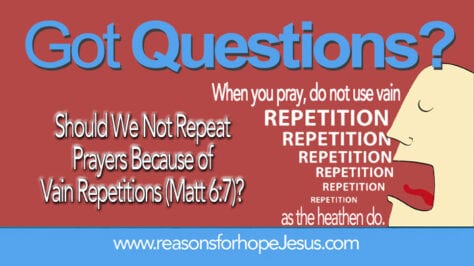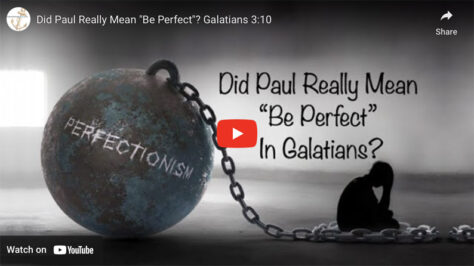
This question addresses the words of Jesus in Matt 6: “when you pray, do not use vain repetitions as the heathen do. For they think that they will be heard for their many words” (Matt 6:7). Let’s gather a little background information before we answer the question.
Jesus spoke these words to the multitudes, a mixed crowd of both Jews and Gentiles. They had gathered “from Galilee, and from Decapolis, Jerusalem, (The Decapolis was a district of 10 cities, south of the Sea of Galilee; all but one were east of the Jordan River. The 10 cities had Gentile populations and Greco-Roman culture.)
The words Jesus spoke, recorded in Matt 6:7, were in the context of a long sermon of instruction in righteousness, found in Matthew chapters 5-7. We commonly refer to this passage of Scripture as the Sermon on the Mount.
The Sermon on the Mount
Jesus opened and closed His ministry with sermons. Matthew 5-7 records His first sermon. Jesus preached this sermon from a mountain near Capernaum (it was really a large hill because there are no actual mountains in that area). Jesus’ last sermon, called the Olivet Discourse, was preached on Mt. Olivet near Jerusalem (Matt 24). The theme of each of these sermons was the kingdom.
The Sermon on the Mount gave instruction in righteous living. Jesus’ words revealed the blessings, the riches, and the “constitution” of the Kingdom. His message was an exhortation to live peacebly and be God-honoring people. The Olivet Discourse was about the coming of the promised Kingdom.
Among the instructions that Jesus told the multitudes in the Sermon on the Mount, was an admonition not to pray using vain repetitions as the heathens do (Mat 6:7). There are significant reasons why Jesus spoke about this.
Reasons Against Vain Repetitions
- Praying with vain repetition was a practice of the heathens. God set apart His people Israel from the heathen nations to be a peculiar people, unlike the heathens. God’s people were to be dedicated to serving Him. As His children, Christians are also set apart from the world. Our citizenship is in Heaven. Therefore, we should never act in a way that the heathens (worldly citizens) act.
- Vain repetitions are not well understood. Vain repetition is defined as a proverbial stammer or stutter, i.e. to talk foolishly or tediously (from the Greek word “battologeo”). The apostle Paul said, “my speech and my preaching was not with enticing words of man’s wisdom, but in demonstration of the Spirit and of power.”
- Vain repetitions are not heartfelt. Our God desires a relationship with us. He wants us to talk to Him as we would talk to a friend. We would not babble on-and-on to a friend, saying the same things over-and-over. We know what would happen. It would confuse our friend and harm the relationship. Instead, we should speak our words with mindful consideration, in meekness and fear (1 Pet 3:15, ie. kindness and gentleness). In doing so, we are better able to more clearly express knowledge, feelings, thoughts, etc. That’s what God wants from us.
Worship and Prayer That Is In Vain
Before giving the admonition to not pray in vain, Jesus warned against praying “like the hypocrites” because they did so to be seen. Rather, Jesus told that prayer is to be an intimate relationship between the Father and His children and that vain repetition is also a way to attract attention to oneself:
Mat 6:5-8 And when you pray, you shall not be like the hypocrites. For they love to pray standing in the synagogues and on the corners of the streets, that they may be seen by men. Assuredly, I say to you, they have their reward. {6} But you, when you pray, go into your room, and when you have shut your door, pray to your Father who is in the secret place; and your Father who sees in secret will reward you openly. {7} And when you pray, do not use vain repetitions as the heathen do. For they think that they will be heard for their many words. {8} Therefore do not be like them. For your Father knows the things you have need of before you ask Him.”
When speaking to the scribes and Pharisees (recorded in Matthew 15), Jesus called them “hypocrites” (Matt 15:7). He then quoted the prophet Isaiah, and thereby indicated they were the fulfillment of Isaiah’s prophesy.
Mat 15:8-9 These people draw near to Me with their mouth, And honor Me with their lips, But their heart is far from Me. And in vain they worship Me, Teaching as doctrines the commandments of men.
Again, we see Jesus condemning vain worship and vain words (words of men). These men Jesus referred to (the scribes and Pharisees) were men of the world who thought their good works made them righteous. They did not follow the doctrines of Jesus, but rather they taught their own doctrines. “Teaching the doctrines of the commandments of men” is similar to those who were speaking “vain repetitions as the heathen do.”
Repetition in Prayer
Jesus’ exhortation was against “vain repetitions.” The keyword here is “vain,” not repetition. In fact, Jesus went on to give a model prayer and it’s one that is often repeated (we call it the Lord’s Prayer, but it’s really the prayer the Lord gave to HIs disciples to pray). If a prayer is repeated, but the words are heartfelt, sincere, and intentional, then it is not a vain repetition.
Repetition is not a bad thing. In Luke 18:1-7 a widow comes before a judge continually asking for justice and Jesus concluded, “… shall God not avenge His own elect who cry out day and night to Him, though He bears long with them?” (Luke 18:7) Crying out day and night, with the same request, is repetitive. But Jesus tells that God will honor that when it flows from our hearts. God knows the intentions of our hearts and there may be times when our hearts are so burdened that we can’t find the words to cry out. Perhaps praying a prayer repetitively is all that one can do. If those words are God-honoring, God-seeking, intentional, and from the heart, God sees and honors that.
It’s not about the words we use. Rather, it’s about the intentions of the heart that determine if a prayer is acceptable unto God. We look at the outward (or the spoken) and we judge what we see. God sees the heart. He knows the real us. And he’s our Father…a good, good Father who loves us.
Pray with Purpose, Not in Vain
Prayer and worship are in vain when repetitive words are used to just “go through the motions.” Or, to put it another way, when the words come from the head and the mouth but are without any heart devotion. There are so many beautiful prayers in the Bible, and repeating them can be God-honoring. Or perhaps you have written your own prayer to God and recite it often. Repeatedly saying such prayers is not in vain if your heart is engaged, your words have intentional meaning, and your desire is to draw closer to God. Don’t be a Pharisee who prays in vain. Be a child of God who approaches one’s Father in faith, hope, and love (1 Cor 13:13).
<*}}}><
Read also: Do You Say or Pray The Lord’s Prayer?
About Prayer
- Should We Not Repeat Prayers Because of Vain Repetitions? (Matt 6:7)
- Do You Say or Pray The Lord’s Prayer? by Karl Heinrich von Bogatzky (1690—1774)
- Can You Pray St Patrick’s Prayer?
- Hear My Prayer, O Lord – 12 Supplications
- A Prayer for Peace in a Troubled World
- A Little Girl’s Prayer for Her Daddy
- The LORD Receives My Prayer
- A Heart for God Revealed in St. Patrick’s Prayer (video)
- Prayers from Billy Graham
- Incessant Prayer (Communion with God)
- The Word and Prayer Together
- My Prayer? That You Would Know . . . .
- Day by Day: Three Things to Pray (Take a fun vision test.)
- Should We Only Pray to the Father as Jesus Taught? Or Is It Okay to Pray to Jesus and the Spirit?
- National Day of Prayer
- Which President Said, "We Will Never Abandon Our Belief in God"
- Do Presidents Pray?
- Why is Prayer Important?
- Effectual Praying
- PAUSE TO PRAY
- And Hezekiah Prayed
- Is Not Voting a Sin? And, how is voting like praying?
- Praying Like The Master
- Pause to Pray for Children
- My Prayer? That You Would Know . . . .
- A Christmas Morning Prayer
- Why didn’t God answer my prayers and heal my loved one?
- What are the various types of prayer? How should I pray?
- Why does the Catholic church pray to “saints,” if Jesus is the only one who can answer prayers?
*******
Jesus is the Reason this Ministry Exists
At Reasons for Hope* Jesus, we are committed to equipping, encouraging, and empowering Christians to know Jesus better, love Him more, and share their faith. We also reach the lost through our Salvation Page.
With your support, we can continue to provide valuable resources and engaging content. Please join us in our mission by donating today. Your generous contribution helps us expand our outreach of sharing biblical truths and hope in Jesus. Thank you for your kindness and for being an integral part of our mission.
*******
*******
***A Hidden Message in Psalm 23?***
Hidden in the six verses of Psalm 23 are 11 names for Jesus. When you subscribe to our newsletter, we’ll send you The Names of God in Psalm 23 PDF that reveals all 11 names and Scripture verses of comfort and hope (link will be sent in your confirmation email).
 A Room with a View of Eternity—The Last Will & Testament of Jesus Christ Take a seat at the Master's table. Learn about the riches He gives to all who are His. This book will bless and encourage you, give you hope, and help you live in the joy of your salvation and the riches of Christ that are yours.
A Room with a View of Eternity—The Last Will & Testament of Jesus Christ Take a seat at the Master's table. Learn about the riches He gives to all who are His. This book will bless and encourage you, give you hope, and help you live in the joy of your salvation and the riches of Christ that are yours.

The Top Ten Got Questions? in 2023
- The Meaning of NUMBERS in the Bible?
- Was Jesus CRUCIFIED on Wednesday, Thursday, or Friday?
- How was Jesus Like a Worm? What’s the CRIMSON (OR SCARLET) WORM in Psalm 22?
- How are the Shepherd’s ROD and STAFF Different?
- How long did JOB SUFFER?
- What is the Significance of the Wise Men's THREE GIFTS? And were they kings?
- Did The Wise Men Arrive 12 DAYS AFTER JESUS’ BIRTH? Or Was It Much Later?
- Jesus’ Last Days TIMELINE: the Cross and the Resurrection
- The Meaning of COLORS in the Bible?
- Did Jesus Fight Satan to Take Back the KEYS of Death and Hell?
There is much to be learned from those who have gone before us in the faith. Check out our Cloud of Witnesses category that features the words of departed saints who are now with the Lord in glory. Their words equip and encourage us even to this day. Take a few minutes to hear...
- ONLY ONE LIFE, Twill Soon Be Past – by C.T. Studd (1860 – 1931)
- “The Love of God is Greater Far” by Frederick M. Lehman (1917)
- Prayers from Billy Graham
- Who Was Robert Robinson? What’s the Story Behind “Come Thou Fount”
- “Immanuel” — A Poem by Charles Spurgeon (1834-1892)
- Who Am I? A Poem by Deitrich Bonhoeffer (1905-1945)
- Understanding the Everlasting Arms of God, by J.R. Miller (1840–1912)
- 24 Reasons Why I Love America, by John Wayne (1907-1979)
- Give Me Perpetual Broken-heartedness (from The Valley of Vision)
- Abide with Me, by James Smith, 1859
This remains one of our most popular pages viewed.![]()

TOP TEN Videos from Reasons for Hope* Jesus
- Memorial Day BAGPIPES TRIBUTE: Amazing Grace
- RISE AND SHINE and Give God the Glory, Glory!
- WERE YOU THERE When They Crucified My Lord?
- PAUL HARVEY: THE BIRDCAGE
- PRESIDENT RONALD REAGAN: A SOLDIER'S PLEDGE
- Hark! the Herald Angels Sing -- CHARLIE BROWN Christmas
- JOHN WAYNE ~ WHY I LOVE AMERICA
- Jimmy Stewart - Nativity Scene Prayer: Mr. Krueger's Christmas
- THE LEGEND OF THE CANDY CANE - A Christmas Story to Share
- Not by Might, Not by Power, But BY MY SPIRIT says the Lord (Zechariah 4:6)
*****************























